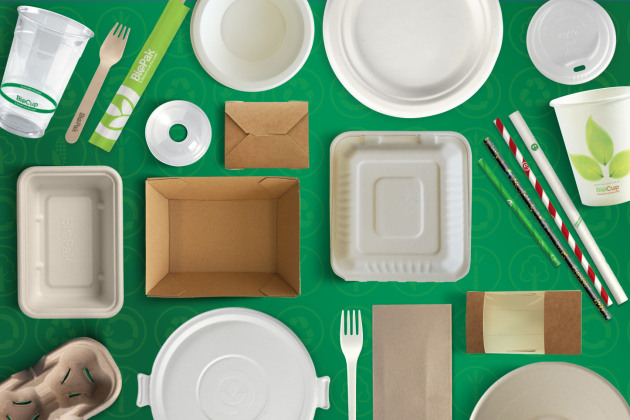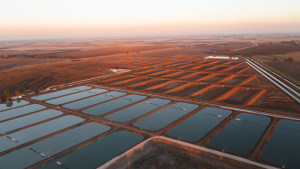BioPak founder Richard Fine has urged the Australian government to make a global commitment to the circular economy, saying it is "incredibly disappointing" that it is not on the top of parliament's agenda.
Fine spoke to PKN editor & publisher Lindy Hughson about the New Plastics Economy Global Commitment [Ellen McArthur Foundation], and what needs to be done to increase plastic recycling.
BioPak has signed up to the New Plastics Economy Global Commitment. What is your commitment and why do you feel it is important?

Our mission is to reduce the environmental impact of single-use food service disposable packaging. We are committed to the development of products made from sustainably-sourced rapidly renewable materials that positively impact humanity and the natural environment at every stage in their lifecycle.
We exist to drive change, inspire the market and lead the transition towards a circular economy.
Accurate data is essential to understand the scale of the problem and required in order to make informed decisions when developing potential solutions. and why reports such the NPEGC are a critical first step in addressing the problem of plastic pollution
We are committed to raising awareness about the environmental impacts of single-use plastic food service packaging and promoting single-use plastic alternative. In addition to this we have committed to developing compostable bio-based alternatives to conventional non-recyclable fossil based plastic packaging, and working with industry and councils to ensure these products are recovered and recycled.
Is this commitment a little too late considering the current international waste crisis?
It’s never too late to change direction once there is awareness that a specific behaviour, choice or decision is having a detrimental impact.
Now is the perfect time to commit to change while the topic is front and centre in the minds of businesses, governments and consumers. As a result of the current global awareness now is the time for all sectors to collaborate, there is still time to fix the problem and by working together towards a common goal, together we will make the world a better place for current and future generations.
The new report reveals the annual plastic packaging volumes for some big companies such as Coca-Cola and Unilever. Do you think this level of transparency will help make a change to global waste?
Yes, transparency is a core motivator to help promote and drive change. This commitment has been created with the aim of making more than 350 businesses across the globe accountable.
Targets have been set to reduce waste and look at alternative solutions. The world will be watching closely to see the year-on-year changes and developments that has been made by some of the biggest users of plastic across the globe. Viable alternatives to single-use plastics are out there, and we hope to drive change.
16 governments across five continents and across national, regional, and city level have become signatories, yet we see no commitment from the Australian Government. What is your take on this?
It’s incredibly disappointing, especially considering the current waste crisis Australia faces. We see NZ, France, UK all signing to make a commitment to a circular economy, why not Australia? This should be at the top of the agenda for parliament.
Climate change is once again a hot topic. It is a growing concern for a large percentage of the Australian general public and should be a priority.
We are seeing progress in cities such as Hobart and Adelaide, but State and Federal governments need to be following suit. Legislation is key for driving significant change at every level.
That said, I will acknowledge that goverment has made some important national commitments, and the Australian Packaging Covenant Organisation is advancing apace with its programs and initiatives, notably its recent report showing precisely how big the gap is that we need to bridge to achieve our 2025 targets.
Signatories include companies representing 20% of all plastic packaging produced globally. Do you think these companies will start to shift towards more eco-friendly packaging alternatives?
The shift is already occurring. We see this with the number of businesses that are making the switch from conventional plastics and using our compostable alternatives. Historically, it has been the smaller business who were leading the change and adopting a more sustainable approach by replacing cheap fossil-based plastics with compostable alternatives.
As the larger companies commit to reducing plastic, this in turn drives investment into research and development and scaling up of more sustainable alternatives. More demand creates more competition which in turn results in efficiencies of scale and ultimately cost reductions of these new materials.
The report shows that consumer goods companies and retailers will commit to increasing recycled content in their packaging to an average of 25% by 2025, compared with the current global average of just 2%. Considering the issues facing Australia at present, do you believe recycling is the answer to tackling plastics and pollution?
Recycling becomes viable if the recycled material has value, it then makes the process economically viable. Legislation mandating the amount of recycled content is a good driver that will result in post-consumer plastics becoming more valuable and once a product has value it will improve recovery and recycling
In addition to mandating minimum recycled content investment in local collection and recycling infrastructure will be required to reduce contamination and produce high quality post-consumer recycled material that can be returned in a closed loop system.





